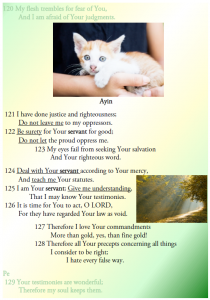 Not for the first time in this psalm, its author seems to be in desperate need of encouragement in difficult times. The requests he makes of God here “indicate a pilgrim feeling himself beset with much that makes him wish that the journey were done. . .” (Andrew Bonar).
Not for the first time in this psalm, its author seems to be in desperate need of encouragement in difficult times. The requests he makes of God here “indicate a pilgrim feeling himself beset with much that makes him wish that the journey were done. . .” (Andrew Bonar).
Three times in the Ayin section the psalmist refers to himself as “Your servant,” and in these eight verses he emphasizes the personal nature of that relationship. “I have done justice and righteousness”–that is, I am doing the work you’ve called me to do, I have been your faithful representative–“and now I ask for what every servant needs from his master: your protection, your mercy, and your direction.”
Do not let the proud oppress me–which they are all too likely to do. As Alexander Maclaren puts it, “good men are often left to be footballs for bad ones.”
Be surety for your servant for good. Vouch for me, be answerable for me, stand by me, pleads the psalmist. Put yourself on the line for me. The word “surety” is the same one used by Judah in Gen. 43:9 as he tries to convince his father to let him take his brother Benjamin to Egypt: “I myself will be surety for him; from my hand you shall require him. If I do not bring him back to you and set him before you, then let me bear the blame forever.”
Deal with your servant according to Your mercy. Though the psalmist has been faithful to his duty, he appeals to a greater faithfulness here. “Don’t deal with me according to my character; deal with me according to yours”–for he knows that while his own faithfulness may fail, the Lord’s mercy never will.
I am Your servant; Give me understanding. “God’s best gift is the knowledge of his will,” says Maclaren, “which He surely will not withhold from spirits willing to serve, if they only knew how.”
Following his pleas, the servant boldly tells the Master how to work: “It is time for You to act, O Lord.” How could a servant presume to speak in this way to his Lord? Possibly because he knows his Master well, and knows the way he jealously guards his word against those who defy it. But the servant’s boldness is also justified by his love of God’s word and commitment to it. “I love your
commandments more than gold! Every detail of your precepts is absolutely trustworthy in every aspect of life! I hate the lying shortcuts that become dark alleys; I will walk the King’s highway.”
Several verses of the Ayin section will seem familiar to you. Verse 123 reminds you of vs. 82 (“My eyes fail from searching Your word”); vs. 124 of vs. 65 (“You have dealt well with Your servant, O Lord”), and vs. 128 of vs. 104 (“Therefore I hate every false way”).
J.A. Alexander and others have pointed out that Ps. 119 may also be starting to remind you of Ps. 19 (which some have called Ps. 119’s index):
119:103 How sweet are Your words to my taste; Sweeter than honey to my mouth.
119:127 Therefore I love Your commandments More than gold; Yes, than fine gold!Ps. 19:10 More to be desired are they than gold,
Yea, than much fine gold;
Sweeter also than honey and the honeycomb.
As you know, nearly every verse of Ps. 119 contains at least one word for the word of God–precept, word, commandment, ordinance, etc. Some have said there are five verses of the psalm that contain no such word; others point to three or two. It depends how flexible you want to be. “Your faithfulness endures to all generations; You established the earth, and it abides,” says verse 90. Is “faithfulness” a synonym for God’s word? It doesn’t look like it to me, but some have said otherwise. There’s no room for ambiguity about vs. 122, though; as far as I know, all the commentators have agreed that in this verse, at least, there is no mention of God’s word.
Image courtesy of chainat / FreeDigitalPhotos.net
